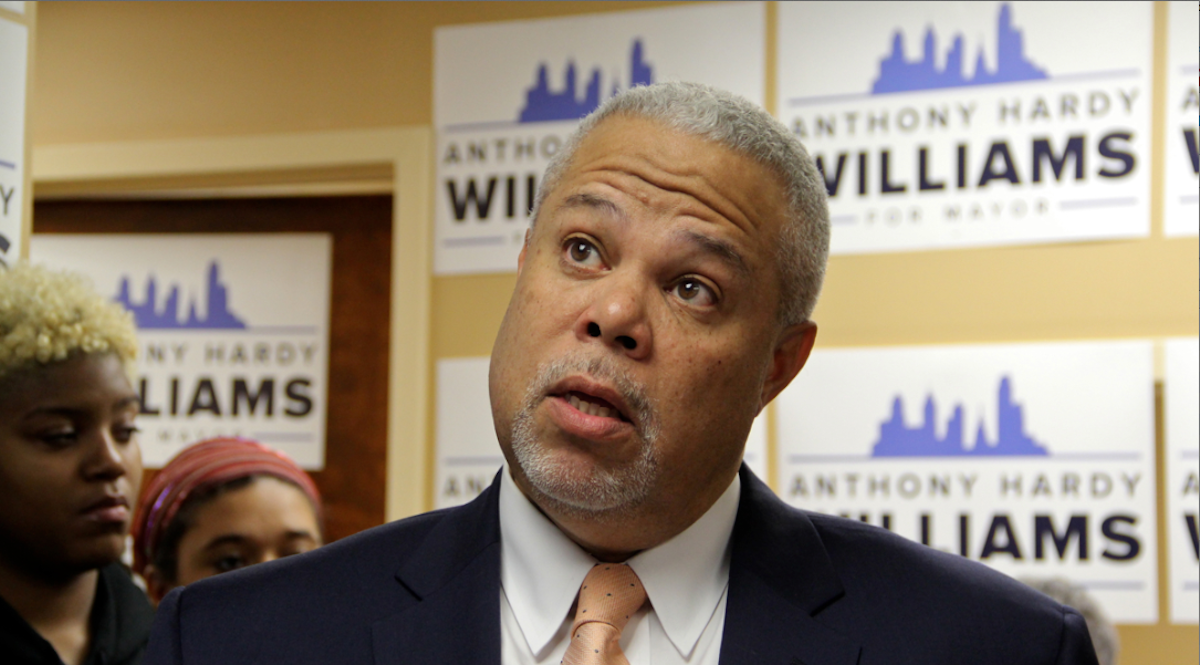Tony Williams finds it ‘curious’ that he’s considered ‘the charter-school guy’

Anthony Williams took objection to being branded 'the charter-school advocate' when others in the race support them as well. (Emma Lee/WHYY)
The lobby of state senator/mayoral candidate Tony Williams’ 18th-floor campaign office featured about as many square feet as number of people who crammed into it when he announced a plan to bring $200 million to the Philadelphia School District on Wednesday.
There, over the course of a half-hour press conference, he laid out a school-funding proposal that’s detailed in Katie Colaneri’s story for NewsWorks, the speech itself (PDF) and a policy paper sent out shortly thereafter (PDF).
But something he said about 17 minutes in caught more of my attention than the numbers being bandied about. The 62-word sentence was as follows:
“Frankly, I think it’s kind of curious that people keep talking about me as the [charter-school] advocate when there are five other people in addition to me who are running who clearly are involved in charter schools and, by the way, use them, and participate with them. And, by the way, in certain areas, they underwrite them, and have raised money for them.”
Interesting enough for me to later follow up and ask why he thought it was “unfair” to be branded a charter-school advocate, and whether he thought this label could affect the race itself.
After all, his senatorial bio includes the charter-guy-ish sentence, “He served as an original architect of Pennsylvania’s landmark charter school legislation, ushering in an era of expanded options for families.”
After correcting my improper use of unfair — I thought he’d used it; though he didn’t, the implication was still there, no? — he expanded as such:
“I don’t have a perception on how it affects the race one way or the other because I think we have about 2.5 months or something like that before the primary, where people will hear us at public events. They’ll have a mic in front of their face. They’ll ask them a question about this. And, over time, if people ask the accurate question, they’ll find we are all supportive of charter schools.
“I guess how you ask the question will relate to how it’s perceived. … The fact is everyone in this race is involved in charter schools. Everybody in this race has supported charter-school public education. And, no one in this race has done more with regard to raising money for public schools than me.
“What I outlined is a fact, it’s a record, it’s factual and you can check it: There’s no one, when you talk about public-school education and funding — and there’s a lot of people talking about how they’re going to get public-school funding — no one has done as much as I have.
“So, what I said was it’s curious that I get tagged as the ‘charter-school advocate’ — and I know, when I talk to you guys, not everybody’s followed me, so I understand that, and someone reads someone else’s information and says ‘oh, he’s the charter-school guy’ and next thing you know, I’m the charter-school guy. I don’t have a problem with supporting charter schools. I guess I talk about it openly. That might be a novel idea while other people talk about it quietly, support it and let other people take the lead. I’m not that person. …
“I guess if I advocate about vocational schools enough, I’ll become the vocational-school guy. I’ll be uncomfortable about that for two weeks, too. But, it is what it is, and I hope the narrative becomes a little broader than one person carrying the weight of one type of school as opposed to a person understanding it’s about all schools.”
Fair enough.
But what seemed interesting here is that this man who has in fact long been an aggressive advocate of charters was talking about them almost as though they were a negative, as a brush he wanted to make sure his competitors got tarred with.
Maybe the signals are that the voters most likely to show up to vote on May 19 are not bullish on charters.
WHYY is your source for fact-based, in-depth journalism and information. As a nonprofit organization, we rely on financial support from readers like you. Please give today.




